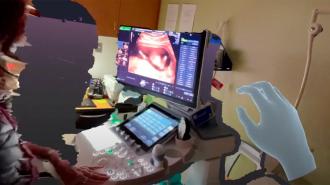Early-stage startup Wist Labs is developing a VR app that converts your smartphone clips into 3D videos — giving you a chance to walk inside your memories using a VR headset.
“We make it easy for anyone to step inside and share their memories, just by taking a video,” Wist Labs co-founder Andrew McHugh told Freethink.
The startup: In 2021, McHugh left his job as a senior designer and team lead for an AR/VR design and prototyping group at Samsung to develop a VR app that would give people a more immersive way to engage with their photos and videos.
“[Photos and videos] act as memory anchors, allowing us to travel back to those moments and the moments around the anchor,” he wrote in a Medium post. “[They] are great to look at, but they don’t give you the same experience as being there again.”
Sixteen prototypes later, he landed on Wist, a VR app now undergoing alpha testing.
“It’s better than a video because it feels like you’re actually there.”
Andrew McHugh
How it works: To create a memory with Wist, a user opens the app and records a video. The app then collects the information it needs to make the 2D clip look three-dimensional.
“During capture, we save color, depth, device pose, audio, and scene information,” McHugh explained to Freethink. “Depth is captured using the LiDAR sensors on the Pro model iPhones and iPads.”
Once the app processes the video, the user can play it back using mobile AR or a VR headset.
“If they have a Quest VR headset, they can step inside their memory more immersively and invite their friends and family into a multiplayer session,” said McHugh.
Looking ahead: The example videos that Wist has shared do a great job of showing how the VR app works, but there’s clearly room for technical improvement — the clips feature lots of glitchiness and missing elements.
The next steps for Wist Labs are to close pre-seed funding, launch a beta, and then roll out features to fill in those gaps and improve the app. Until then, McHugh plans to continue using it to capture and share memories of his first child, who was just born in September.
“I loaded [an ultrasound video] into our VR app, shared it with my mom who lives halfway across the country, and we were able to both walk around that moment together,” he told Freethink. “It’s better than a video because it feels like you’re actually there.”
We’d love to hear from you! If you have a comment about this article or if you have a tip for a future Freethink story, please email us at tips@freethink.com.
Update, 10/19/22, 9:30 a.m. ET: This article was updated to correct Andrew McHugh’s title at Samsung and his child’s birth month.
